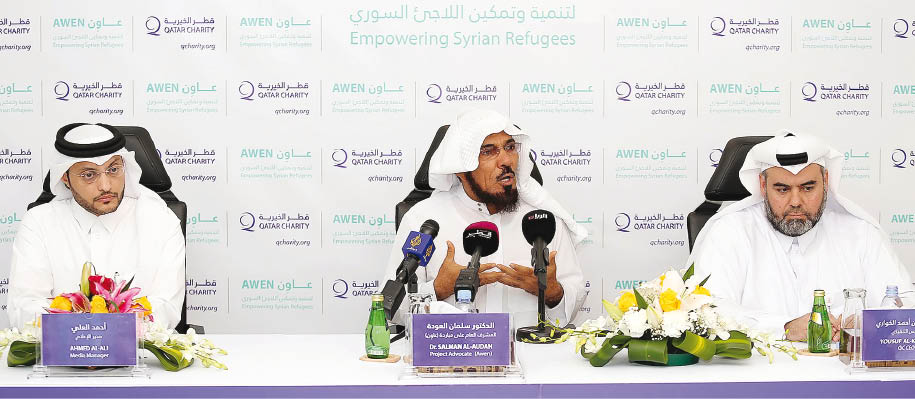

DOHA: Qatar Charity (QC) has inaugurated ‘Awen’ (Help, an initiative to support and empower Syrian refugees in Turkey.
Awen, supervised by Sheikh Dr Salman Al Ouda, is a developmental humanitarian initiative to shed light on the suffering of the refugees in Syria, in particular Syrian refugees.
It also aims to develop and improve the refugees’ abilities and find them jobs in various fields, and support or implement innovative and creative sustainable projects beneficial for them.
Yousef Al Kuwari, CEO, QC, said, “What makes Awen special is that it focuses on the developmental side of solving the Syrian refugees’ problems. It aims to offer a dignified life for the Syrian refugees and their families. What we aspire to do through it is offer life-long, life-changing solutions for the Syrian refugees. We thank Sheikh Al Ouda for accepting to supervise the initiative”.
Sheikh Al Ouda said, “As Muslims, 3,000,000 Syrian refugees are in our care. Awen is a relief response to their plea for help. In the Quran, Allah says, ‘Help ye one another in righteousness and piety’ and what could be more righteous than standing by the side of our deprived brothers and sisters?”
Awen is not only about offering a limited number or types of services; it will also address their needs in various fields of development such as training, economic empowerment, education, health and shelter.
It targets all groups of the Syrian refugees and others in Turkey, including young children, youth, elderly and women. Awen seeks to cooperate with all charity institutions and organisations and active parties to facilitate financing and implementation of projects through QC’s partners.
It includes voluntary visits and activities for the Syrian refugees at their camps and places of residence in Turkey in coordination with regional partners; awareness, promotion and media campaigns and activities; and training courses, lessons and lectures.
According to a survey, the number of Syrian refugees in Turkey reached more than 2,200,000 in the second half of last year and is expected to go up to 3,000,000 in the near future. The study also revealed that 10 percent of them live in camps — considered the poorest and most suffering group.
The Syrian refugees’ work conditions may further deteriorate if no action is taken for the benefit of over 300,000 Syrian workers who work without registration, which means they do not have social insurance. The Peninsula




